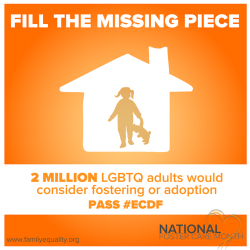
The ECDF Act would prohibit any entity that receives federal child welfare funds from discriminating against prospective adoptive or foster parents on the basis of their sexual orientation, gender identity, or marital status, or due to the sexual orientation or gender identity of child in foster care. ECDF provides clear guidance to states, and promotes the best interests of the children in the foster care system by increasing their access to the safe, supportive, and permanent homes.
ECDF is desperately needed. In the U.S., there are 397,122 children are living without permanent families in the foster care system. And while 101,666 of these children are eligible for adoption, nearly 32% of these children will wait over three years in foster care before being adopted. What’s more, research suggests that about 5 to 10 percent of young people in foster care are LGBTQ identified and they—along with Black children–typically fare poorly in this system. Also disturbingly, Black children languish in foster care longer than any other foster kids.
It’s those children that would benefit the most if Congress moves on ECDF. According to some studies, LGBTQ families are more likely to be interracial, diverse, and willing to adopt out of their racial and ethnic identities. ECDF could make a real difference to both the family and the child where they have an opportunity to receive the love and recognition they deserve.
While we continue to press for policies that support families and keep LGBTQ and children of color in their families of origin, we should also support legislation like ECDF that helps children caught in the foster care system find loving and supportive homes until they can be with their families again.
